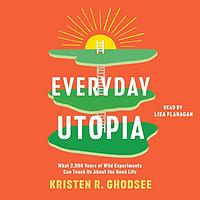You need to sign in or sign up before continuing.
Take a photo of a barcode or cover
Everyone knows I’m a sucker for utopia- this was a really cool look at different visions and versions of people actually trying to make it happen. The chapter break up by topic was pretty cool and I loved the conversation on militant optimism. There’s a lot of info kind of dumped in parts but overall I think it’s the messaging here that’s far more important than the exact details of X groups decision making structure or what have you. I’d definitely recommend this to anyone who feels hopeless in the current climate/economic/military crisis!
hopeful
informative
medium-paced
hopeful
informative
inspiring
medium-paced
Considering Ghodsee has written extensively on Islam in the past, this book contains a jarring and substantial omission. In her first chapter, she lists (pg. 17 of hardback) “a long history and amazing diversity of utopian traditions regarding the private sphere”. Her complete list: “pagans, Christians, Jews, Hindus, Buddhists, anarchists, pacifists, socialists, feminists, and environmentalists have all shared similar ideas about how we can better organize our homes and communities.” The rich history of Islamic utopian thought is completely absent from this book, and her only reference to Muslims or Islam comes on pg. 194 in her “Angry Bachelors” section, where she posits that polygyny might be a cause of Islamic terrorism. The fact that Ghodsee skips over Islamic philosophers entirely, and only mentions Islam in the context of terrorism, is extremely disappointing.
To illustrate how serious this omission is, I’ll give just one example. Muhammad al Farabi (870-951 AD) is considered to be one of the most prominent early Islamic philosophers, and the founder of Islamic Political Philosophy. In his famous work, “The Virtuous City” (Al-Madina al-Fadila), he puts forth a robust vision of a socialist state, which is in line with all the other religions and traditions Ghodsee discusses. “Al-Farabi creates his project "Virtuous City" on the assumption that the attainment of human happiness can be actualized only in a society, based on mutual aid and solidarity, where a man is not isolated. Achieving happiness, he thought, can be when people come to a general "cooperative living", which leads to right education, right management and right views.” [Kurmangaliyeva & Azerbayev, “Al-Farabi’s Virtuous City and its Contemporary Significance
(Social State in Al-Farabi’s Philosophy),” Anthropologist, 26(1,2): 88-96 (2016). http://krepublishers.com/02-Journals/T-Anth/Anth-26-0-000-16-Web/Anth-26-1,2-000-16-Abst-PDF/T-ANTH-SV-26-1,2-088-16-1875-Kurmangaliyeva-AG/T-ANTH-SV-26-1,2-088-16-1875-Kurmangaliyeva-AG-Tx[14].pdf ]
I did not get far enough in this book to judge it by its contents, except the discussion of Islamic terrorism. But paired with the complete omission of Islamic utopianism and Islamic philosophy in general, I found this survey of “amazing diversity of utopian traditions” to be at best woefully inadequate, and at worst, an example of bias against Islamic philosophy and cultures.
hopeful
informative
inspiring
reflective
medium-paced
Obsessed with this book and the world building it inspires. Housing, child rearing, family and relationship styles, capitalism, and patriarchy are all included here with historical context and hopes for how we move forward.
informative
inspiring
reflective
medium-paced
hopeful
informative
4.5 stars. I spent the summer digging into utopias. Republic, Utopia, The City of the Sun, Flowers in the Mirror, Red Star, Island, The Dispossessed, and others. This was my culminating book.
Imagining different ways of organizing ourselves, especially with regard to the insidious capitalist system that rules us all, is such a mental stretch, but a worthwhile one for me. It helps redirect my fear, anger, sadness, and feeling of powerlessness. :>/
For the most part, Ghodsee makes really salient points, but a few of the later chapters' arguments end up feeling stretched a little thin.
It's incredibly well-sourced, and excellently cited!
Imagining different ways of organizing ourselves, especially with regard to the insidious capitalist system that rules us all, is such a mental stretch, but a worthwhile one for me. It helps redirect my fear, anger, sadness, and feeling of powerlessness. :>/
For the most part, Ghodsee makes really salient points, but a few of the later chapters' arguments end up feeling stretched a little thin.
It's incredibly well-sourced, and excellently cited!
First half was interesting, second half was a trudge. Mostly the authors ideas about why the nuclear family is defunct, not really any ideas about utopian living (apart from the "expanding" the concept of family)




